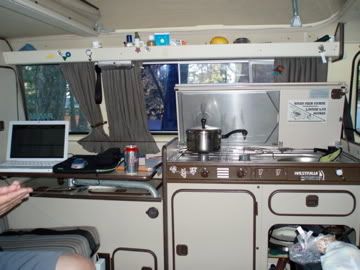"His." I could be generous and suppose that Wall Street Journal reporter, Jose de Cordoba meant Venezuelan social projects, rather than a health care system or farm established solely for use by the President. But this appears not to have been a verbal stumble for de Cordoba. In today's article, Farms are Latest Target in Venezuelan Upheaval, he goes on to state that land reform is possible because by 2005, Mr. Chavez "controlled the courts as well as congress..." The socialist reforms undertaken by the Chavez government make use of "rhetoric" that "smacks of the 1960's..." "Some Chavez initiatives recall disastrous past experiments with collective agriculture, such as... the Cuban revolution, which helped turn one of Latin America's richest lands into one of its poorest."
Venezuelan Coffee Farm
Millions of acres, 8.8, have been reclaimed for agricultural use by the poor. Less than half the distributed land was owned by the state. Micro-lending programs have been corrupted. Food production appears to be down. Too bad de Cordoba "reports" with such bias and ignorance of history politics and economics that his writings on the challenges of the nation's current revolutionary undertakings can not be taken with any confidence.
 While the front page gives gallery space to the dangerous faults of returning land and trusting food production to the masses under a socialist system, today's WSJ page D-1 gives us a rosy version of the same story, under our very own capitalist system. For Sale: Condo w/ Chicken Coop, by Sara Schaefer Munoz shines light on a growing trend among housing developers. "Forget the golf course community," she tells us. The demand wasn't necessarily quick access to the gentleman's game. It was about living in a green community, where outdoor space and views are protected. Condos and new homes are being built around existing farms, or in conjunction with new agricultural developments.
While the front page gives gallery space to the dangerous faults of returning land and trusting food production to the masses under a socialist system, today's WSJ page D-1 gives us a rosy version of the same story, under our very own capitalist system. For Sale: Condo w/ Chicken Coop, by Sara Schaefer Munoz shines light on a growing trend among housing developers. "Forget the golf course community," she tells us. The demand wasn't necessarily quick access to the gentleman's game. It was about living in a green community, where outdoor space and views are protected. Condos and new homes are being built around existing farms, or in conjunction with new agricultural developments.So, a developer in southwest Florida constructs a 17,000 acre housing community surrounded by "73,000 acres including a nature preservation and a cattle farm" and the WSJ states that "for city folks, moving to a farm can require some adjustment." When the democratically elected leader of Venezuela offers a free 2-year farm voc-tech program for urban poor, the WSJ considers it a "hodgepodge of Marxism, 'ancestral' Venezuelan farming methods and Cuban fertilizing techniques."
Are we clear now? Spend between $200,000 and million on a home with access (hands on or off) to an organic farm in Florida, and you're part of a pioneering, eco-friendly revolution. Start a farming cooperative under the leadership of a Latin American president working to end decades of corporate pillage and massive absentee landownership, and you're destined for (continued) poverty if not starvation.
(The Wall St. Journal arrives at the house every morning courtesy of a plethora of airline miles not eligible for use on actual flights.)
We're planning to head out on Monday, so I'm working overtime to meet my news junkie need. Other stories making their way through my mind-
» The F-16 flare drop over south Jersey. Not only is the story of note, but the comments at this site have been fantastic.
» James Comey's testimony before the Senate Judiciary Committee is notable as much for its content as for his candor and humility. Never, in a million years, would I have trusted John Ashcroft as the last line of defense for our constitution. Suppose history shows him as our last principled attorney general.
» US investors are finally just saying no to profiteering in war-torn Sudan. I'm overly optimistic in wishing that some of that pulled capitol would be directed, even "funneled" into social programs in the region.
» Christopher Hitchens is unapologetic in his lack of remorse for the recently deceased Jerry Falwell. This on the heels of Richard Dawkins' "...you're an atheist about all those Gods, some of us just take it one God further..." debate with Steven Colbert.




No comments:
Post a Comment